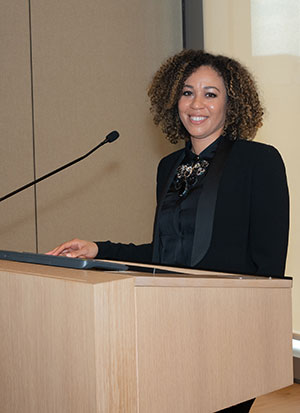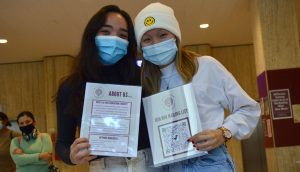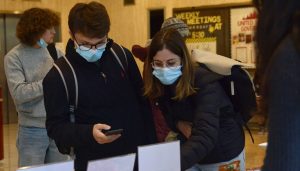Organized by Marisa Villani, senior assistant dean for undergraduate studies at the Gabelli School of Business; Tracyann F. Williams, Ph.D., assistant dean for student support and success at Fordham College at Lincoln Center; and Christie-Belle Garcia, Ph.D., assistant dean for student support and success at Fordham College at Rose Hill, the event included more than a dozen graduating seniors from Fordham’s new First Gen Network.
Seniors Leslie Ann Abreu and Qi Di Zhang kicked off the ceremony with a heartfelt thank-you to attendees—“the people who have formed networks of support for first-generation graduating students”—before introducing keynote speaker Adrienne Boykin, a 2009 Gabelli graduate and a member of Fordham’s Multicultural Organization Supporting Alumni Initiatives and Community (MOSAIC) affinity chapter.
“This is truly a moment to celebrate for both you and your families because we know, as first-generation college students, we are not only celebrating for ourselves, but we’re also celebrating on behalf of our families and our communities,” Boykin said.
Words of Wisdom from a Fordham Grad

After studying accounting at Fordham, Boykin earned an M.B.A. from Mount Saint Mary College. In 2014, she “came full circle” when she joined America Needs You, a nonprofit offering mentoring and career development support to first-generation college students. She’s currently the organization’s chief financial officer.
Boykin encouraged graduating seniors to celebrate their achievement and take a minute to reflect on their college journey, especially times when they may have felt impostor syndrome.
“With the support of your family, your friends, and the Fordham community, you remembered that you actually earned your spot at Fordham, that you belong, and that you are paving the way for not only yourself but for future generations to go to college and to graduate,” she said. “The perseverance and strength that you have [shown] all of these years led you to today.”
Boykin imparted three tidbits of wisdom: “Impostor syndrome will continue to present itself in your life; however, you can and will get through it. Mentorship matters. And keep an open mind during life’s journey.”
Following Boykin’s address, each student’s name was called, and they received a commemorative pin. The ceremony also included a champagne toast.
A Supportive Alumni Community
A handful of alumni were also in attendance. As first-generation grads themselves, they offered advice and shared tips they’ve picked up in the years since they graduated from Fordham.
Marcella T. Barry, FCRH ’92, GSE ’96, vice chair of the President’s Council— a group of successful professionals and philanthropists committed to mentoring Fordham’s future leaders—encouraged students to stay connected to Fordham after graduating, and to “wave their first-gen flag” whenever possible.
“You do belong here because you worked really hard,” said Barry, the chief people officer at Jitjatjo, a staffing marketplace and workforce management platform. “Embrace it, and don’t hide it. Talk about it. It defines who you are, and in life, it’s those stories that are really important to tell.”
Jason Caldwell, GABELLI ’10, ’17, GSAS ’11, a vice president at Goldman Sachs and another President’s Council member, had an informal chat with the soon-to-be graduates during the reception. He gave them his contact info—and urged them to use it.
“Because Fordham has been so generous to me, I feel like it’s my duty to do the same,” he said, sharing that every position he’s held since graduating has been due to his Fordham connections.
“If someone ever tells you that they’re willing to help you and to give them a call or reach out, take them up on it,” Caldwell said. “That’s the only way that you can get ahead and move forward more easily.”
A Family Role Model and Future Educator

Abreu, a psychology major whose family migrated to the Bronx from the Dominican Republic when she was 13, said she takes pride in being the first college graduate in her family, and in serving as a role model for her little sister and her whole family.
She’s enrolled in the Accelerated Master’s in Teaching Program at Fordham’s Graduate School of Education. After earning her bachelor’s degree this month, she’ll continue working toward a master’s degree specializing in bilingual childhood education.
More than providing her with an education, Fordham has helped Abreu come out of her shell. “When I first came over here, I thought I’d be able to manage without socializing,” she said. “I used to be very introverted, very closed off. It’s been a transitional four years. I was not expecting that I’d be able to really step out of my comfort zone and express all my ideas and perspectives.”
Keeping Your Options Open
Chantz Kouveras said that although his parents made clear their desire for him to attend college, he wasn’t always sold, instead contemplating some career paths that didn’t require a college degree. But ultimately, he was swayed.
“I wasn’t necessarily seeing the opportunities that college would open up,” said Kouveras, who will earn a bachelor’s degree in political science and classical civilization, and will serve in the National Guard after graduation. “Looking back, I’m grateful because when you’re 18, you have no clue how many doors you’re going to be closing to yourself if you don’t take certain opportunities.”
One of the most surprising things about college, Kouveras said, was how much he had to figure out for himself, such as housing registration; luckily his friends and the Fordham community helped him navigate it all.
“There’s a lot that’s just kind of left to you,” he said. “To me, that’s just the college experience: figuring what you have to figure out on your own and building a network to help you out with that stuff.”
Preparing for a Career, Not Just a Job
Qi Di Zhang, a Long Island native who studied business administration with concentrations in marketing and consulting and a minor in economics, credits Fordham with teaching her balance.
“Being first-gen, I had to figure out how to balance schoolwork, getting a job, socializing, and having time to take care of myself,” she said.
Growing up, Zhang said that attending college was considered “a no-brainer” in her home. Her parents “came to America with the notion that you’re here to have better opportunities, and the first step of that is to get a better education.”
“My mom didn’t finish middle school, and my dad didn’t finish high school. My parents have jobs,” she said, “but they want me to have a career.”
Founded by students last fall, the First Gen Network connects and supports students who are the first in their families to pursue college degrees. Allies of first-generation graduates are welcome.
]]>
A QR code in a plastic holder sat in a prominent position on their table; visitors who scanned it were directed to an Instagram account for their group.
Their goal? Recruit Fordham students, faculty, and administrators to join First Gen Network, a group formed this semester to support students who are the first in their families to attend college. Since 2017, Nov. 8 has been celebrated as National First Generation Day.
“When I had to choose a college, it was during the pandemic, and it was so difficult because my parents didn’t really know much. It was a daunting process—picking schedules, learning about loans, and things like that,” said Stegmuller, a second-year Fordham College at Lincoln Center student.

The tabling event, which was also held at Rose Hill, was part of a kickoff for the group, which was convened in September by Tracyann Williams, Christie-Belle Garcia, and Marisa Villani, the assistant deans for student support and success at Fordham College at Lincoln Center, Fordham College at Rose Hill, and the Gabelli School of Business, respectively.
Stegmuller and Chen, a senior at the Gabelli School of Business, said they were attracted to the group, which is planning to hold a panel discussion in the spring because it offered connections to members of the community who they otherwise would never meet. Neither knew each other before joining the group.
Stegmuller said one of the things she’s come to appreciate is how many first-generation students have to overcome an inclination to do everything themselves.
“We’re just so used to doing everything on our own, so it’s good to have a group where we can reach out and learn to ask for help. When people are like ‘Oh, just go to office hours, or ask the dean for help,’ to us, it’s like, ‘No, I can do that myself,’” she said.

Nicole Varela, a first-year FCLC student, was one of the students who signed up to join the group. Her parents both attended college in El Salvador but never finished. She benefitted from the fact that her older brother went through the process two years before her.
“SATs, ACTs, college essays—I feel like people who know a lot more about that have an advantage, but we talked to people who knew the process, and they helped my brother through it.
“In this group, there are going to be a lot of different people with different experiences, but we all have one thing in common, so that’s nice.”
Students weren’t the only ones the group attracted.
Elizabeth Stone, Ph.D., professor of English, joined because, she said, it’s important to provide a model for what’s possible for students, particularly those who, like her, were both the first to attend college and the first to become a professor.
“I think it’s important for people who may be interested in going into academia to realize there are people who came from the backgrounds that they came from who walked that road, and they can walk it too if they want to.”
First Gen is welcoming members of the Fordham community who are both first-generation students and those who want to support them. For more information, visit here or email [email protected].
]]>
Thanks to a program called GABELLI SMART, it won’t be entirely unfamiliar. For six weeks this summer, the incoming undergraduates have been meeting via Zoom with small groups of fellow first-year students, junior and senior students, alumni, faculty, and administrators.
A Leg Up
The sessions for these groups, or “neighborhoods” as they’re called, began the week of June 29 and run through the week of Aug. 10. Each neighborhood—named for an area of New York City—comprises roughly 20 students who were grouped together by interest and geography. The idea is to give incoming first-year students a leg up before they officially start their studies.
Marisa Villani, senior assistant dean for undergraduate studies, said GABELLI SMART is an expansion of an existing program that has involved first-year students reading the same book together through the summer, most recently The Promise of a Pencil (Simon & Schuster, 2014)
“We’ve seen tremendous feedback from past years that students are excited, want to engage, and want to get started,” she said, noting that the expansion of SMART was in the works long before the COVID-19 pandemic struck.
Donna Rapaccioli, Ph.D., dean of the Gabelli School, has high hopes that GABELLI SMART will lend real support to students’ academic, professional, and personal journeys.
“Gabelli SMART brings together the best part of the Gabelli School of Business, and what I am most proud of—its community, she said.
“The intention was to introduce the students to many of the members of our community that they will interact with in the fall, and that they will be better prepared for a very successful launch to their college journey.”
Asking Questions and Creating Community
Undergraduate juniors and seniors are serving as advising mentors to the new students, giving them an opportunity to ask any and every question they may have. These mentors will also supervise the teams’ creation of crowd-sourced Instagram stories depicting what they believe it will take to be a successful Gabelli School student.
Betsy Parr, assistant dean for first-year students at the Rose Hill campus, noted that this is different from years past, when students were asked to complete writing assignments over the summer individually.
“This summer, it’s with your neighborhood. Some of them might be from your high school, but also might be two or three states away. So, it’s about attempting to create these bonds of community and shared collaboration before starting the Gabelli program,” she said.
Meetings vary between 30 and 60 minutes and are held at times convenient to most participants. The first was run by an academic adviser and student mentors; subsequent ones were organized by alumni, faculty, and personal and professional development advisers.
Building Teamwork Skills
Andrew Santis, GABELLI ’16, joined meetings with the neighborhoods dubbed Madison Avenue and St. Mark’s. Santis, a marketing major who currently works for a digital media startup, said he emphasized the way his time at the Gabelli School taught him how to work on a team through first-year classes such as The Ground Floor and second-year projects like the Consulting Cup.
“I told them, ‘At first you think, ‘Oh great, it’s another group project,’ but it actually does help you so much because now that we’re all remote, you really have to turn to those teamwork skills,” he said.
“You’re working with people who are potentially in a different time zone, and you’re no longer working with people in person, so you have to be better at communicating with people, whether it’s through Slack, Zoom, or email.”
Developing Helpful Habits
Michael McSherry, GABELLI ’78, a senior lecturer at the Gabelli School who teaches The Ground Floor, met for 60 minutes on July 27 with 10 students in Southern Boulevard, a neighborhood whose students all hail from the Central United States.
In addition to personal introductions, he spent time talking about strategies for success, such as time management skills and balancing the many priorities they will encounter during their four years. He also discussed the importance of immersing oneself in the day’s business news, by reading The Wall Street Journal or business news aggregator sites such as The Morning Brew.
“It’s good for conversation, it helps develop the critical thinking skills they will all nurture during their four years at Fordham, and it also enables them to refute or reaffirm the topics and skills they learn in the classroom,” he said.
Anthony Silvestri, one of two first-year advising mentor coordinators, has been working with the group Mosholu Parkway, a roadway he’s gotten to know in real life as a Ram Van driver. Their first meeting went better than he expected, he said, especially since this year he and another coordinator, Samantha Barrett, consciously mixed a few international students in with the stateside groups. Meetings are taped for students in distant time zones, but many logged on live anyway, he said.
Barrett, also a Ram Van Driver, picked Bronx River Parkway for the neighborhood she supervises, which is made up of students from the Global Business Honors Program, of which she is also part. She was pleasantly surprised at how easily the group conversed with each other, with very little prodding from her.
“Had we not had three months of Zoom class, it would be kind of weird and shocking to do this, but … given all that’s happened over the past five months, it kind of feels normal,” she said.
Indeed, in some ways, Villani said the COVID-19 pandemic has opened up doors to try ideas that might have been off the table previously. In addition to an online series being led by a business ethics professor for high-achieving students, the college has hired support staff to design synchronous and asynchronous wellness and mindfulness session with students and will be rolling out online storytelling sessions with alumni.
“If you anchor high with your GPA your first semester, you’ll be astronomically more successful throughout your college career and a strong GPA will help lead to internship offers that lead to job offers,” she said.
“By introducing the students’ community early on, they have an even greater chance of doing their best in their first semester.”
]]>